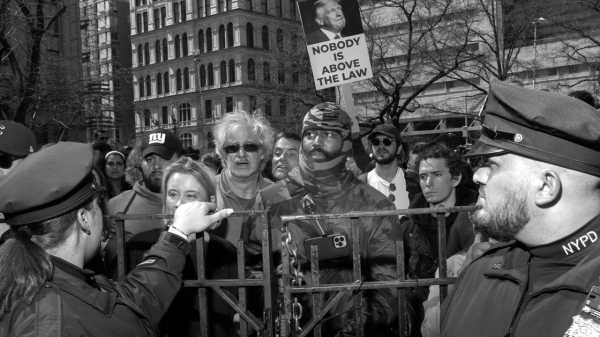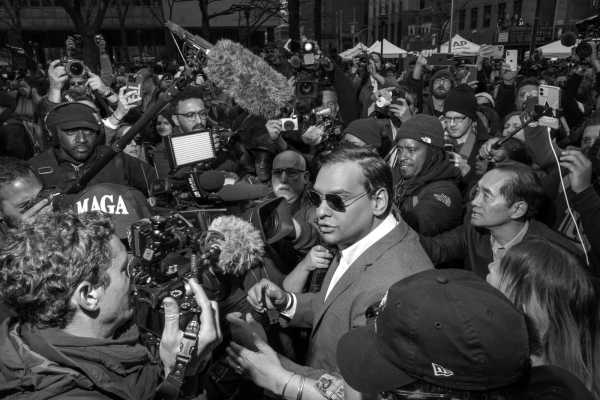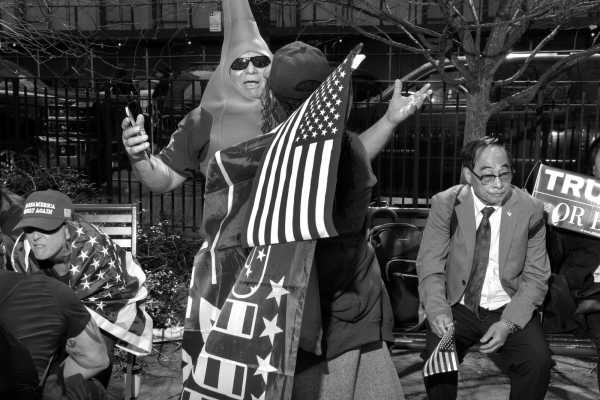
On Monday afternoon, Donald Trump’s son Eric posted a tweet to his four million followers. “Watching the plane . . . from the plane,” he wrote, attaching a P.O.V. image from inside his father’s private jet, where a shiny-wood-panelled television was showing footage (from Fox News, natch) of the Trump-branded plane he was sitting on, readying for takeoff at the Palm Beach International Airport. Given the circumstances of the trip, Eric Trump’s tweet felt a bit too “Look, Dad, we’re on TV”-gleeful, but he wasn’t wrong to acknowledge the spectacle, which was only just beginning. This was a big day not just for the Trump family but for the entire nation: the first time in history that an American President had been called to face criminal charges. Trump’s passage from Mar-a-Lago to Manhattan, an antihero’s journey that traversed our country’s Eastern corridor, was feverishly followed by major news organizations and meticulously documented on the three “T”s of social media: Twitter, Truth Social, and TikTok.
Eric Trump’s words also captured something else about his father’s indictment, which, despite its historic and political significance, also felt notable for its hall-of-mirrors-like quality. This may be Biden’s America, but once again we were in Trump-land, a place that has long been defined by its seemingly endless simulacra: the constant loop of memes and clips and posts that come ever closer to replacing actual events as they are happening, making us into observers instead of conscious actors in a shared reality. In a sense, we were all watching the plane from the plane. And it’s hard to imagine that Trump wasn’t at least a tiny bit thrilled by this return to the media spotlight, much like a fired reality-TV star who has been invited to make a guest appearance on a later season of a show. Rolling Stone reported that, although Alvin Bragg, the Manhattan District Attorney, offered Trump the possibility of a private arraignment on Zoom, the former President nonetheless chose a high-profile midday surrender to the court. As Warren Beatty once said, of his onetime girlfriend Madonna, “She doesn’t want to live off-camera.”
For better or for worse (likely the latter), Trump’s thirst for being watched has always been matched by our perhaps even greater thirst for watching. And so I was predictably sucked in, first by the aerial shots of Trump’s motorcade making its way from his Mar-a-Lago estate to the airport in West Palm Beach, reminiscent, in speed and scale, of the O. J. Simpson white Bronco chase, and, in aesthetic, of a funeral procession, with its long line of black S.U.V.s. Then there was the Trump plane’s takeoff, paired with a CNN anchor’s solemn narration. As the former President’s red-white-and-blue jet rose into the air, the anchor described Trump’s return to New York as a homecoming unlike what he ever would have imagined or wanted, while still being one that “he’s doing and one that he is trying to make the most of”—a phrasing that led me to imagine the former President squeezing in some shopping and lunch with the girls in SoHo after his visit to the Lower Manhattan courthouse. Meanwhile, outside Trump Tower, in Midtown, where another motorcade would eventually drop Trump off for an overnight stay at his triplex, before picking him up again on Tuesday afternoon to take him to his arraignment, there seemed to be more press and lookie-loos than either MAGA supporters or #resistance liberals.
We’re used to seeing the hubbub surrounding former Presidents, and in that respect Trump’s arraignment, an event of pomp and bad circumstance, felt like Opposite Day. Armed with all the motorcades and private jets and Secret Service men in the world, he was returning to New York not to attend a state funeral, stump for a party mate, or open a Presidential library (as if) but to turn himself in to law enforcement. Then again, this was all perfectly in line with Trump’s wild-and-wooly Opposite Day Presidential tenure, of which I was keenly reminded by the absolute freak show that awaited him at the Manhattan Criminal Courthouse on Tuesday.

George Santos outside the Manhattan Criminal Courthouse.
Though the press might still have outnumbered the protesters, there were plenty of demonstrators on both sides. The MAGA bunch was, predictably, more colorful. Reporters spotted a man wearing American-flag shortalls with no shirt; a guy in an “I Love Jesus” beanie carrying a placard identifying “Bragg’s Jews” (the onetime Trump henchman Michael Cohen, who testified against his former boss in front of the New York grand jury, among them); and a woman in a QAnon T-shirt and a jacket painted with the figure of Trump as an American-flag-waving toreador. There was a Trump impersonator with one of the worst wigs I’ve ever seen, and a skirmish between a MAGA-hat-wearing bleached blonde and a gray-haired anti-Trump protester who looked like an extra from “Portlandia.” And then there were, of course, representatives George Santos and Marjorie Taylor Greene, perhaps the true dregs of the current G.O.P. (After she was driven away by protesters blaring whistles as she tried to speak into a megaphone, Greene gave an interview in which she compared Trump’s plight to that of Nelson Mandela and Jesus Christ.) All the while, Trump was posting on Truth Social. “Heading to Lower Manhattan, the Courthouse. Seems so SURREAL — WOW, they are going to ARREST ME. Can’t believe this is happening in America. MAGA!,” he wrote, with a curious self-alienation, as if he, too, was not actually experiencing this predicament but watching it on TV (which, come to think of it, he probably was).

There were plenty of demonstrators on both sides, and the MAGA bunch was, predictably, more colorful.
Once Trump arrived at the courthouse, the footage became relatively sparse. Cable-news stations broadcast aerial videos of the former President exiting his car accompanied by security detail. No cameras were allowed in the courtroom, but five photographers were allowed to take still images of Trump entering and leaving, and social media pored over the same few shots of the former President, taken before and after he pleaded not guilty to thirty-four felony counts of falsifying business documents, in connection with a larger catch-and-kill scheme. According to my colleague Eric Lach, who was in the courtroom for the arraignment, Trump seemed, for once, cut down to size, as the judge informed him of the charges against him. The glum mug Trump showed in the pictures I saw—a mute grimace unleavened by a regulation toothy grin or a double thumbs-up sign—suggested as much. Even his hair seemed deflated. His suit collar was stained. (Derek Guy, a menswear guru on Twitter, noted that these may have been oil-based stains from cosmetics.) And yet, by the time he was back at Mar-a-Lago, to which he hightailed it in the Trump plane immediately after his moment in court, he seemed revived, making a speech in which he, predictably, decried Bragg’s case against him as “a persecution.” Making his way to the lectern as Lee Greenwood’s “God Bless the U.S.A.” played, Trump smiled, waved, shook hands, and mugged for the many iPhones held aloft to capture him. Back where he belonged, he was ready, once again, to face the cameras. ♦
Sourse: newyorker.com






